Team:BCCS-Bristol/Calendar-Notebook/23 July 2008
From 2008.igem.org
m |
|||
| Line 19: | Line 19: | ||
[[Image:BCCS-WetLabMC1000_25C_1.JPG | 150px]] | [[Image:BCCS-WetLabMC1000_25C_1.JPG | 150px]] | ||
| + | [[Image:BCCS-WetLabMC1000_30C_3.JPG | 150px]] | ||
The cells transformed with biobrick were grown on ampicillin plates as if transformed are able to do so, however there was no growth of bacteria except when pUC19 was used. this highlights some problem with the DNA and not the actual transformation. Repeated experiment with larger amounts of TE buffer around spot and with different Biobrick. results tomorrowom | The cells transformed with biobrick were grown on ampicillin plates as if transformed are able to do so, however there was no growth of bacteria except when pUC19 was used. this highlights some problem with the DNA and not the actual transformation. Repeated experiment with larger amounts of TE buffer around spot and with different Biobrick. results tomorrowom | ||
Revision as of 16:42, 24 July 2008
Results for Chemotaxis experiment showed that both strains were actually repelled by aspartate, possibly because the concentration was too high.
The cells transformed with biobrick were grown on ampicillin plates as if transformed are able to do so, however there was no growth of bacteria except when pUC19 was used. this highlights some problem with the DNA and not the actual transformation. Repeated experiment with larger amounts of TE buffer around spot and with different Biobrick. results tomorrowom
Beads The bead we had focused on had gone!! lots of beads had clumped together, areas of dead/non-motile bacteria also filamentous - possible conaminant. also areas of still motile bacteria. bacteria had travelled 40% of way across bridge, suggest thinnner bridge.
 "
"

